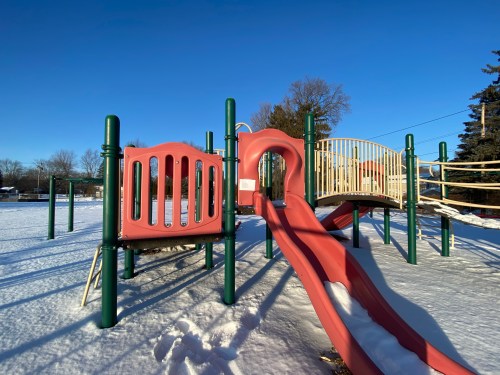February is Black History Month, and I have six poems queued up to celebrate it. Each poem shines a light on parts of U.S. history not emphasized in my own history education, which unfortunately was of the Social Studies ilk. (Social Studies, boring and artificial, caused huge gaps in my knowledge of world history and geography.) The racial blind spots in my childhood textbooks leave me with some catching up to do. So here we are, learning new things every day.
Today’s poem is “Moonlily” by Marilyn Nelson. She recounts her schooling experience on a California Air Force base in the 50’s as the only black girl in a classroom of white children.

Moonlily
(Mather AFB, California, 1956)
by Marilyn Nelson
When we play horses at recess, my name
is Moonlily and I’m a yearling mare.
We gallop circles around the playground,
whinnying, neighing, and shaking our manes.
We scrape the ground with scuffed saddle oxfords,
thunder around the little kids on swings
and seesaws, and around the boys’ ball games.
We’re sorrel, chestnut, buckskin, pinto, gray,
a herd in pastel dresses and white socks.
We’re self-named, untamed, untouched, unridden.
Our plains know no fences. We can smell spring.
The bell produces metamorphosis.
Still hot and flushed, we file back to our desks,
one bay in a room of palominos.

I had to do a little research to understand this poem. Horse research. You may well be shocked at how little I know of horses, but in case you’re as ignorant of equine terminology as I am, here’s a guide:
A yearling is a one- or two-year old horse. Think of yearlings as tweens, not yet in puberty but close. Yearling mare just means the young horse is female.
Sorrel, chestnut, buckskin, pinto, gray are different horse colors. Most are brown-ish (sorrel, chesnut, gray), one is spotted brown and white (pinto), and only one (buckskin) is a light color.
A bay is a brown horse. A palomino is pale golden horse with a white tail and mane, the horse of royalty, parades, and the Mr. Ed show. Palomino only refers to color, not to a particular breed.
Now let’s talk about horse girls. The speaker in this poem (it is autobiographical, so let’s call her Nelson) is clearly a horse girl. You don’t have to ride horses to be a horse girl—as long as you’re a socially clueless pre-teen obsessed with horses, you qualify. (Warning: the horse girl world is a rabbit hole of memes and videos I spent way too much time in. Two of the best and weirdest: link here to watch a girl jump like a horse, and here to watch a grown-up horse girl galloping along.)
“Horse girl energy” means being blissfully unaware about what other people think of you or what you wear or what you’re interested in. That’s a wonderful place for any child to be, girls in particular, Black girls especially. In the yearling stage of girlhood, girls are at the peak of feeling unselfconscious of their bodies, running wild and free in their play, and in the language of the poem, self-named, untamed, untouched, unridden.
There’s so much joy in this sonnet, so much motion and color. At play most of the girls are brown horses; they run together in a herd, dressed the same in their pastel dresses and saddle shoes. Outside the only divisions that matter are between big kids and little kids, between boys and girls. And then comes the recess-is-over bell. For Nelson, filing back into the classroom means more than the end of fun. It’s the end of belonging. The sudden, acute isolation this little girl feels stabs my heart—
Still hot and flushed, we file back to our desks,
one bay in a room of palominos.
*
If anyone is looking for a worthy organization to donate to this month, Detroit Horse Power is an equestrian center that works with urban youth. Here’s their mission statement:
Detroit Horse Power uniquely addresses two persistent problems facing the Motor City: the shortage of opportunities for metro Detroit’s vulnerable populations (especially children) and the abundance of vacant land. Through riding and caring for horses in a safe and enriching space, program participants learn valuable skills that set them up for future success.
Link here for more information.
*
 Marilyn Nelson was born in Cleveland, Ohio in 1946. Her father was in the Air Force, one of the last of the Tuskegee airmen, and her mother was a teacher. The family moved often from military base to military base.
Marilyn Nelson was born in Cleveland, Ohio in 1946. Her father was in the Air Force, one of the last of the Tuskegee airmen, and her mother was a teacher. The family moved often from military base to military base.
She started writing poetry at a young age. She graduated from University of California-Davis, got her Masters from University of Pennsylvania, and her PhD from University of Minnesota.
“Moonlily” is from a memoir-in-sonnets called How I Discovered Poetry, named in 2014 as one of NPR’s best books of the year. She’s published seven volumes of poetry for adults, eleven for young adults and four for children. She is also known for her translations of Danish poetry. She’s won many awards, among them the Ruth Lilly prize, a Guggenheim fellowship, and the Frost Medal.
She was professor emerita of English at the University of Connecticut. In 2003 following her retirement from teaching, she founded Soul Mountain Retreat near her home in rural Connecticut. She has two children.
i thought for sure i’d see the prancercise video… nonetheless, enjoyed the visuals of this poem and the lessons re: horses. thx for sharing!
Forgot about the prancercise lady! She’s got some horse girl energy for sure!
got a good laugh out of these horse videos; wasnt expecting that. Great post!
Thanks, my little elf darling